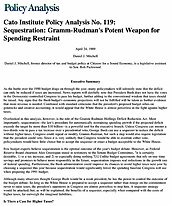As the battle over the 1990 budget drags on through the year, many policymakers will solemnly state that the deficitcan only be reduced if taxes are increased. News reports will dutifully note that President Bush does not have the votesin the Democratic-controlled Congress to pass his budget, further adding to the conventional wisdom that taxes should be raised. Any signs that the Bush budget’s economic projections will not be fulfilled will be taken as further evidencethat more revenue is needed. Combined with standard criticisms that the president’s proposed budget relies on gimmicks and creative accounting, it would appear that the White House is almost powerless in the fight against higher taxes.
Overlooked in this analysis, however, is the role of the Gramm-Rudman-Hollings Deficit Reduction Act. Most importantly, sequestration — the law’s procedure for automatically restraining spending growth if the projected deficit exceeds the target by more than $10 billion — is a powerful tool for the executive branch. Unless Congress can muster a two-thirds vote to pass a tax increase over a presidential veto, George Bush can use a sequester to reduce the deficit without higher taxes. Congress could repeal or modify Gramm-Rudman, but such a step would also require legislation that the president could veto. Since it is very unlikely that Congress would be able to override either veto, policymakers would have little choice but to accept the sequester or enact a budget acceptable to the White House.
Few budget experts believe sequestration is the optimal outcome of the year’s budget debate. However, as Federal Reserve Board chairman Alan Greenspan stated in testimony to the Senate Budget Committee, “it is certainly desirable, 1) to a tax increase, and 2) to especially doing nothing.“1 Unlike budget agreements that rely on one-timesavings and promises to behave more responsibly in the future, sequestration imposes real reductions in the growth rateof federal spending. Furthermore, the Bush administration could improve its chances to avoid higher taxes next year by choosing a sequester this year because sequestration would significantly lower the spending baseline Congress will use when preparing the 1991 budget.
Although many observers thought George Bush would be a weak president, he has the power to control the outcome ofthe budget debate. So long as the White House is prepared to accept a sequester rather than renege on the commitment never to raise taxes, the president’s opponents in Congress are almost powerless to stop him. A sequester strategy would be attacked, but, as will be explained, the benefits of a sequester, especially when compared with the costs of higher taxes, far outweigh the imagined liabilities.

This work is licensed under a Creative Commons Attribution-NonCommercial-ShareAlike 4.0 International License.

